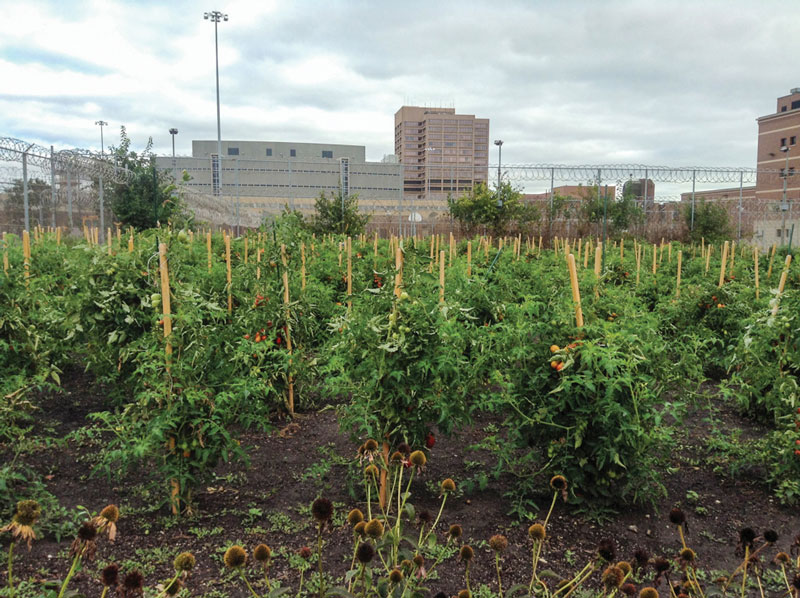During summer’s golden days, a visitor to the spacious garden off 27th and California streets in Chicago’s Little Village neighborhood could believe the abundant plot is located in the farm communities of rural Illinois instead of urban Cook County. Heavy watermelons, pumpkin vines, and peanut plants grow low. Beds of Swiss chard and other leafy produce take over the greenhouse. Giant sunflowers tower over caged tomato plants. But even higher than the sunflowers is an item that seems somehow out of place in this lush environment: a cyclone fence capped by spiraling barbed wire.
Welcome to the Cook County Sheriff’s Garden project at the Cook County Jail.

Established in 1993 as a place of respite and diversion for inmates, the garden, under the direction of Sheriff Thomas Dart, has grown into an award-winning job-training initiative for nonviolent offenders who earn a certificate of competency in various areas of horticulture. For the past two years, IIT students enrolled in an Interprofessional Projects (IPRO) Program directed by Blake Davis, adjunct professor of industrial technology and management, have worked to extend the jail garden’s growing season. With outdoor space of just over one acre and a 1,500-square-foot greenhouse, the garden annually yields many thousands of pounds of produce that is sold to several Chicago restaurants and supplies a vendor’s stand at the Daley Center Plaza Farmers Market. Proceeds go back into the program to maintain its self-sufficient status.
Carlos Irazabal (ARCH 4th year) says a unique hydronic solar-heating system was IPRO 497-320B’s major contribution to the project. The system is designed to provide a transfer of heat by circulating fluid through cross-linked polyethylene tubing known as PEX. Installed at root level in the plant beds, the tubing would concentrate heat to support plant life during winter.
“I’m thankful to the students of IIT for their dedication to our urban farming programs at the Cook County Jail,” says Sheriff Dart. “These students should be proud of the impact they’ve made in helping inmates develop skills that can be applied on the outside and may very well turn their lives around.”
IPRO Evolution IPRO 320 (spring 2013): Plants Behind Bars
OBJECTIVE
- To design a cold-climate hoophouse for use in the Cook County Jail garden that could support the raising of microgreens. The jail requested that the students utilize donated solar panels in the design of the heating system. The hoophouse should be simple enough for the inmates to erect, yet strong enough to withstand significant snowfall.
OUTCOMES
- Preliminary design for the hoophouse, including the structure, and heating and drip-irrigation systems
- Construction manual
IPRO 497-320B (fall 2013, spring 2014): Reformative Growing
OBJECTIVE
- To review and further refine earlier design of hoophouse structure and systems, selection of materials, and proposed budget.
OUTCOMES
- Refined design by building a prototype of a hoophouse on a student’s farm property and produced a new construction manual to correspond with this new structure
- Conducted site visits to both The Plant to research details regarding a possible aquaponics system, and Growing Home, an established agricultural job-training organization
- Surveyed and measured Cook County Jail site for hoophouse construction
- Constructed frames for solar panels
- Determined that the hoophouse will need to incorporate a more-active heating system in addition to passive heating to sustain the minimum temperature of 45 degrees Fahrenheit needed to sustain such hardy green stock as kale and lettuce varieties
- Designed two heating-system plans for consideration by jail administration, the first based on immersion heaters and the second based on an ethylene glycol-based closed system